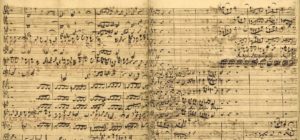I sometimes startle students by asserting that the two greatest theologians of the Western Christian tradition are Dante Alighieri and Johann Sebastian Bach.
I certainly mean no disrespect to Augustine or Aquinas, Barth or von Balthasar. . .and so on, through the alphabet. But for intimate wedding of theological depth and affective sublimity, Dante and Bach have no peers. Perhaps only Augustine comes close. They each created a world whose exploration is unending and endlessly fulfilling.
Recently, I have been watching the DVD of a remarkable performance of Bach’s Saint Matthew Passion. It was recorded in Berlin by the Berlin Philharmonic under their conductor Sir Simon Rattle. The soloists are outstanding, the choir superb. Mark Padmore as the Evangelist is utterly exhilarating. This alone would have made the purchase worthwhile. But what is truly unique is that the performance is not static, but enacted. Soloists, chorus, orchestra members, even the conductor, are engaged in acting out the text. Words come to life in an extraordinary fashion as they are declaimed not merely vocally, but bodily.
As the booklet included with the DVDs puts it: “Here Christ’s passion is not simply retold in the form of a narrative whose events took place in the past, but is depicted with a directness that allows us to experience it at first hand and to feel for ourselves the emotions triggered by the events that the work describes.”
Such, of course, was Bach’s own intent and in this performance it is realized in a particularly vivid manner.
The “staging” was conceived by the theater director Peter Sellars, whose guiding principle, however, was not so much “drama” as “meditation.” The interaction of the characters is less dramatic confrontation than dialogical interaction whose fruit is to draw us near to prayer.
As a “bonus,” the CDs also contain a long interview with Sellars. This offering is decidedly not “filler,” but rather an intriguing insight into his immense admiration for Bach (the Saint Matthew Passion is the “Mount Everest of music”) and into his deeply personal understanding of the work.
For Sellars the Passion is more about doubt and struggle than it is about certitude. Bach, he rightly maintains, is never “abstract,” but intensely personal, experiential, indeed, “bodily.” In this regard Sellars reacts against some performance practices of the early twentieth century that tended toward a ponderous monumentality, bespeaking doctrinal rigidity and bourgeois religion. He sees this as imposing an ideological overlay upon Bach’s searching freedom.
Yet Sellars seems less cognizant of the “ideological” tendency of his own interpretation, which fits rather too comfortably into the “spiritual not religious” bent of our contemporaries. Still, in suggesting this, I do not mean to be facilely dismissive. Sellars is too sensitive to Bach’s genius to miss the lure toward transcendence and transformation that is embodied in the Passion.
But what does not emerge clearly, at least in his recorded remarks, is the Christic cantus firmus, which undergirds the sublime music. What is the goal of transcendence? The shape of transformation? For Bach the response is patent: Jesus Christ is both the goal and the way. The Matthew Passion for all its drama, struggle, and suffering is ultimately a love song between Bridegroom and bride.
Here a recent book serves as complement and completion to the perspective Sellars articulates. In Bach’s Major Vocal Works: Music, Drama, Liturgy, Yale professor, Markus Rathey, speaks of the Saint Matthew Passion’s “underlying narrative” as that of a “love story.” He writes that the very opening movement “admonishes the listener to hear the passion as something that Christ, the bridegroom, who loves the bride, the believer, has done out of love. His suffering and pain stand as testament to his love.”
It is no wonder that Bach is sometimes spoken of as “the fifth Evangelist,” for he proclaims with all the force of his faith and the inspiration of his genius that Jesus Christ is Lord, Savior, and Lover. Yet every Christian, by virtue of his or her baptism, is also called to evangelize, to witness to the joy of the Gospel, the joy of knowing and loving the Lord Jesus.
Too often, however, Catholics seem rather squeamish about professing their love of Jesus. That may be all right for “Evangelicals,” but it’s not quite the Catholic thing. Thus faith risks remaining “abstract,” merely “notional,” rather than personal and experiential. And there is little impulse to share it with others
Here some words of Pope Francis can cut to the quick. He writes in Evangelii Gaudium:
The primary reason for evangelizing is the love of Jesus, which we have received, the experience of salvation which urges us to ever greater love of him. What kind of love would not feel the need to speak of the beloved, to point him out, to make him known? If we do not feel an intense desire to share this love, we need to pray insistently that he will once more touch our hearts. We need to implore his grace daily, asking him to open our cold hearts and shake up our lukewarm and superficial existence. [264]
In this regard, Bach can be a true instrument of grace, one who touches hearts and enkindles an ardent desire to love Him who so loved us. And to sing out our love.















